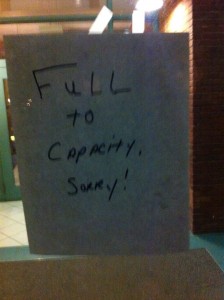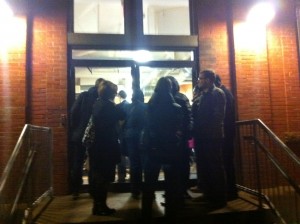
Hartford, CT- On Thursday March 1, 2012, we attempted to attend one of Governor Malloy’s community forums on education reform. The forum was part of a series of events that Malloy is holding around the state to discuss and build support for his proposed changes to the state education system. The bill titled, “An Act Concerning Educational Competitiveness” proposes to slim the education gap in Connecticut by taking a series of measures within the classroom. Some of the main proposals contained in Malloy’s bill involve overhauling teacher tenure plans, increasing teacher accountability, and increasing funding for new charter and magnet schools. The event created a high turnout and was filled to capacity well before it was scheduled to begin. We were met at the door by security guards informing us that they could not allow us to enter. Many others were turned away in a similar fashion.
After being initially turned away, instead of leaving immediately we attempted to hear what was going on from one of the side doors of the building. While it was impossible to hear anything that was going on inside and almost impossible to see anything besides people sitting in their seats, we began discussing some of the topics that were being discussed tonight. At first we were impressed that these people were extremely aware of the educational reform, however, it turned out that the group of people attempting to look in was not filled with parents or civilians, but was mostly made up of Hartford public school teachers who were irate at many of Malloy’s proposals. They angrily voiced their displeasure at elements within the bill that would judge their performance solely on test scores and give schools the power to fire tenured teachers if the test scores of their students were not sufficiently high. “Basically it’s union busting,” said one teacher, “because they’re removing competitive bargaining and they’re removing due process”. They told us that they couldn’t stop the unions, the government couldn’t disestablish the unions, but this was their way to make the teachers’ union weaker. Some of these teachers had been working in the public school system for as long as twenty-five years, and some said that they were now debating switching into a different line of work if some of the major components of the bill were not changed. When we told them that we had some interest in teaching in the future, one promptly responded with “don’t”. He claimed that because of this bill, we were entering an era where it was the worst time to become a public school teacher, and among all the budget cuts and reform the new bill was proposing, none of it was aimed towards helping students get a better education: “There’s no proof that any of these proposals will actually help students. They’re just trying to save money.”
Many of the complaints from the teachers were simply that the people inside presenting the bill were attempting to run schools like a business and that some did not “know what the inside of a classroom looked like”. Many of the teachers were upset that they had been kept out of the decision making process. One teacher complained: “business people wrote this, teachers didn’t write it. It’s a corporate model. Students aren’t products. These are poor children here. They’re trying to make money off of the backs of poor children.” As the teachers stood outside with us, answering some of our questions, and at times just voicing their frustrations, they denounced charter schools and Teach for America because these institutions allow uncertified teachers into the classroom. “Of course we’re against charters,” said one of the teacher, “this is privatization. You have to connect the dots. They’re trying to get rid of us because we’ve been here the longest and we have the most benefits”. They claimed that higher ups were simply trying to make cuts so they could put more money in their own pockets. Teachers frequently made comments about how ridiculous it was that teachers had to wait outside as the room was filled with businessmen, security guards, and young students, who the bill did not affect nearly as much. In fact, many of the teachers were suspicious of the fact that the event was held in such a small room while there was a large high-school auditorium across the street. “They’re trying to silence us,” said one teacher. “They don’t want the teachers here. They’re locking us out.” The group of teachers then walked away from the door, giving up on any hopes of hearing anything going on inside, and hoping that maybe they could be heard at another forum, planning on showing up an hour early.
